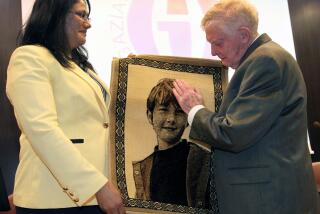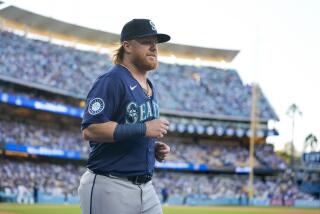The Cardiac Kid : Year After Heart Transplant, Teen-Ager’s Life Is Full Speed Ahead
- Share via
REGION — Reminders of his old heart, which one doctor called “a piece of junk,” are on Christopher Turner’s bedroom desk. A pacemaker is in a plastic bag. An electrocardiogram printout shows his second cardiac arrest. And photos taken in the hospital show him hooked up to more wires and tubes than can be counted.
The old heart itself is the only thing he doesn’t have.
“They wouldn’t let me keep that,” Turner said with a laugh at his family’s home in Downey.
On a recent afternoon, the day before the first anniversary of his heart transplant at UCLA Medical Center, he had been bicycling.
“I went down to the beach and rode seven miles,” he said. His looks gave no hint how sick this 18-year-old once was. He is 6 feet 2 1/2, weighs 190 pounds and has thick black hair, blue eyes and a tan.
For the last year it’s been smooth sailing, with no signs that Turner’s new heart is being rejected by his immune system. Turner takes drugs to ward off rejection, and will take them daily for the rest of his life. In addition to riding his bike, he goes for long walks and has been allowed to lift weights.
“I want to try bungee jumping,” he said.
When Barbara George, one of his doctors, heard that, she said, “I’ll kill him!”
Despite his ordeal, Turner managed to graduate from Valley Christian on time. That had been his goal. Monday, he entered USC as a freshman majoring in civil engineering.
Chris Turner had always been a healthy kid, and there was no history of heart disease in his family.
But in January, 1991, while in Downey Community Hospital for a hernia operation, doctors found something ominous. His pulse rate, as he was prepared for the surgery, was 140, twice the normal rate.
Tests revealed he had an enlarged heart, a condition called dilated cardiomyopathy. It is similar to the condition that afflicted Loyola Marymount University basketball star Hank Gathers, who died in 1990 after collapsing during a game.
Turner was put on medication and had to avoid physical exertion. Four months later he got bronchitis, which left him weak, exhausted and barely able to complete his sophomore year at Valley Christian.
For a time he got better and began a summer job in the occupational therapy department at USC, where his mother, Robin Turner, is an administrative assistant.
But he soon became ill again. This time it was congestive heart failure, which caused his lungs to fill with fluid and left him severely fatigued.
He was referred to UCLA Medical Center and saw a specialist about a possible heart transplant. In July, 1991, not long after being put on the transplant waiting list, he suffered his first heart attack while in the hospital.
Early that August he underwent a 12-hour procedure that tried to correct his unstable heart rhythm. It was unsuccessful. By this time his weight had dropped to 140 pounds.
Two weeks later, he went into cardiac arrest again at the hospital. He doesn’t remember the first heart attack, but clearly recalls the second. It happened early in the evening while his parents were in his intensive care unit.
“I said I was feeling lightheaded,” Turner said. “Right after I said that, my mom said, my eyes rolled back and I passed out.”
Doctors and other personnel rushed to the room and administered electrical shocks to try to get Turner’s heart to beat. They also punched him in the chest. The hardest hitter was Casey Culbertson, a 220-pound pediatric cardiologist.
“I didn’t open my eyes, it was all black,” Turner said, “but I do remember feeling the chest compressions. When they stopped I opened my eyes, and there they were. It clicked what had just happened. It was just so quick I didn’t really think, ‘Am I dying? Am I dead?’ ”
He looked at the two doctors--Culbertson and cardiologist Alvaro Galindo--and said, “Who thumped me?”
Each pointed to the other and said, “He did,” according to Turner.
“I was asking to thank them,” Turner said. “But they were afraid I was going to hit them back.”
What he said then, according to his father, was “Thanks for the jump-start.”
“I don’t remember that,” Turner said. “I could have said that.”
Unable to control Turner’s heart rhythm, the medical center gave him a pacemaker and sent him home. Too ill to go to school, he was tutored at home during his junior year.
As the year went on, he got better, but for what he wanted to do--go biking and camping--his heart might as well have been a paper valentine.
“They told me I could have gone on for a long time with my original heart,” Turner said, “but it would be a really restricted, boring life. I wanted a new heart not only to restore my health but get the quality of life back.”
The call finally came at 11:10 p.m. on Aug. 18, 1992.
He had gone out to play pool with a friend. He had asked his mother if he could stay out until midnight, but she wanted him home at 11.
“Six minutes after I came home, UCLA called and said, ‘We have a heart for you,’ ” he said. “I just started to cry because I was excited. I had been expecting the transplant to come around December or January, so I was real anxious for it to happen.”
Robin put her camera in her purse--her son wanted pictures taken after the operation--and the Turners headed for UCLA.
On the way, Chris Turner was calm. “I was more happy and relieved than scared and nervous about the surgery,” he said. According to the UCLA Medical Center, where 75 heart transplants were performed in 1992, 84% of its patients survive the first year after the transplant, and 71% survive for five years.
Turner was in the operating room by 1:30 a.m., and five hours later, his new heart, which had belonged to a 14-year-old boy, was beating inside him. (The medical center doesn’t reveal specific details, but donor hearts usually become available from accident victims with fatal head injuries.)
By 9, Turner was awake and alert. Unable to talk because of a breathing tube in his mouth, he asked a nurse for a clipboard and pencil.
“I asked him if he was in any pain,” Robin Turner said, “and he wrote, ‘I feel great.’ It made me cry.”
Turner went home with his new heart and began his senior year of high school. Since transplant patients are susceptible to illnesses the first few months after the operation, he was tutored at home the first semester.
He returned to Valley Christian for the second semester, and became known there as “Chris the Cardiac Kid.” During an assembly, he was presented with a cake shaped like a heart. Turner, who graduated with honors, received a standing ovation from his classmates at commencement.
George Turner said his son has been “an absolute pillar of strength.”
“Chris knew from the beginning that he might not survive the surgery,” he said. “He was never down with his head in his hands, saying, ‘Why me, Lord?’ ”
Turner’s personality also endeared him to doctors, nurses and other transplant team members at UCLA.
“He’s a great guy, a very giving person,” said cardiologist Juan Alejos. “If we had a perfect example of what a transplant patient is, Chris would definitely be at the top of the list. He comes in and talks to patients considering transplants about their fears and doubts.”
On that recent afternoon, Turner, wearing his Valley Christian T-shirt, mentioned how his parents and sister, Anne, and girlfriend, Traci Torres, had always been there for him.
“I think the medicine plays a big part,” he said, “but I don’t feel I could have done as well or recovered as quickly if it wasn’t for the support of friends and family, and my personal Christian beliefs.”
During his long ordeal, Turner was often heard to say, “I don’t ask for a lighter cross, but a stronger back.”
It became a motto that he and those around him took to heart.


